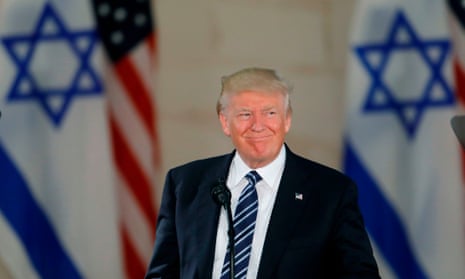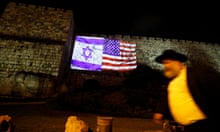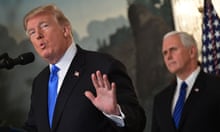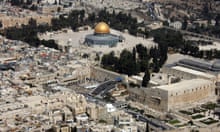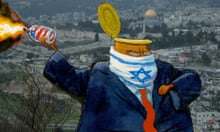Donald Trump’s recognition of Jerusalem as the capital of Israel has drawn an angry and despairing response from global and regional leaders – who warned it would destroy the peace process, strengthen extremists and weaken the standing of the US in the world.
In an address to reporters moments after the US president had finished speaking, the UN secretary general António Guterres said he opposed “any unilateral measures that would jeopardise the prospect of peace for Israelis and Palestinians”.
“In this moment of great anxiety, I want to make it clear – there is no alternative to the two-state solution,” Guterres said. “There is no plan B.”
Earlier on Wednesday Pope Francis had issued a heartfelt plea to Trump to respect the status quo of the city, and to conform with UN resolutions. The pope told thousands of people at his general audience: “I cannot keep quiet about my deep worry about the situation that has been created in the last few days.”
Q&AWhy is recognising Jerusalem as Israel's capital so contentious?
Show
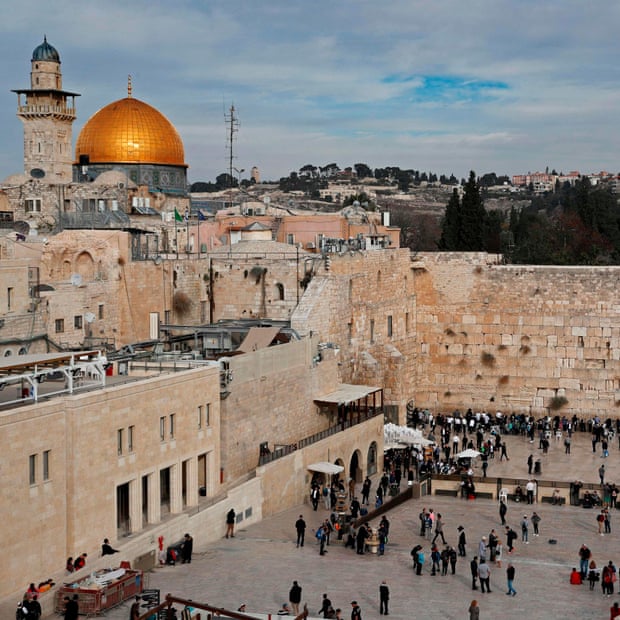
Of all the issues at the heart of the enduring conflict between Israel and the Palestinians, none is as sensitive as the status of Jerusalem. The holy city has been at the centre of peace-making efforts for decades.
Seventy years ago, when the UN voted to partition Palestine into Jewish and Arab states, Jerusalem was defined as a separate entity under international supervision. In the war of 1948 it was divided, like Berlin in the cold war, into western and eastern sectors under Israeli and Jordanian control respectively. Nineteen years later, in June 1967, Israel captured the eastern side, expanded the city’s boundaries and annexed it – an act that was never recognised internationally.
Israel routinely describes the city, with its Jewish, Muslim and Christian holy places, as its “united and eternal” capital. For their part, the Palestinians say East Jerusalem must be the capital of a future independent Palestinian state. The unequivocal international view, accepted by all previous US administrations, is that the city’s status must be addressed in peace negotiations.
Recognising Jerusalem as Israel’s capital puts the US out of step with the rest of the world, and legitimises Israeli settlement-building in the east – considered illegal under international law.
He said he hoped “wisdom and prudence prevail, in order to avoid adding new elements of tension to a global panorama that is already convulsed and marked by so many cruel conflicts”.
At the regional level, the response was universally hostile, including from Saudi Arabia, a steadfast ally of the US. Riyadh said its continuing efforts to negotiate a peace deal, starting with a unification of the Palestinian leadership, would be damaged by the US plan. King Salman told Trump by telephone that a change to Jerusalem’s status would escalate regional tension, Saudi media reported.
A spokesman for the Turkish president, Recep Tayyip Erdoğan, said the US was “plunging the region and the world into a fire with no end in sight”.
The Turkish foreign minister, Mevlüt Çavuşoğlu, said he had told the US secretary of state, Rex Tillerson, that Washington was making a grave mistake, and the whole world was against the decision. Turkey has suggested it might cut diplomatic ties with Israel if the embassy move goes ahead.
Lebanon said Trump’s decision had put back the peace process by decades, and that it threatened regional and perhaps global stability. Qatar’s foreign minister described it as a death sentence for all who seek peace. Jordan said Trump had violated “international legitimacy”.

There were reports of a protest outside the US consulate in Istanbul on Wednesday evening. In Tunisia, a labour union described the announcement as a declaration of war and called for a mass protest there.
The French president, Emmanuel Macron, was the first western leader to reject the announcement, saying the final status of Jerusalem had to be settled by negotiation. He called for calm and for restraint from violence.
The British prime minister, Theresa May, said the UK opposed Trump’s decision on Jerusalem and called it “unhelpful in terms of the prospects for peace in the region”.
“We disagree with the US decision to move its embassy to Jerusalem and recognise Jerusalem as the Israeli capital before a final status agreement,” she said. “The British Embassy to Israel is based in Tel Aviv and we have no plans to move it.
“Our position on the status of Jerusalem is clear and long-standing: it should be determined in a negotiated settlement between the Israelis and the Palestinians, and Jerusalem should ultimately be the shared capital of the Israeli and Palestinian states. In line with relevant security council resolutions, we regard East Jerusalem as part of the Occupied Palestinian Territories.”
Both Germany and France updated travel advice to their citizens, warning of possible clashes in Israel and the occupied territories.
At the request of Jordan and the Palestinians, an emergency meeting of Arab foreign ministers will be held on Saturday. The Arab League warned that any such recognition of Jerusalem would be a blatant attack on the Arab nation. The Organisation for Islamic Co-operation will meet in Istanbul on 13 December in a special session to co-ordinate a response.
Iran’s supreme leader, Ayatollah Ali Khamenei, said any move to recognise Jerusalem as Israel’s capital was made “out of despair and debility” because “their hands are tied and they can’t achieve their goals”.
Khamenei, who is stridently anti-Israel, told government officials: “Victory belongs to Islamic Ummah. Palestine will be free, the Palestinian nation will achieve victory.”
The UK’s response was at the milder end of the spectrum. Speaking before Trump’s announcement, Boris Johnson, the British foreign secretary, said he was concerned but that it was important to wait for the details of the president’s statement.
Before meeting Tillerson, Johnson said the decision “makes it more important than ever that the long-awaited American proposals on the Middle East peace process are now brought forward, that should happen as a matter of priority”.
In London, the Jewish Board of Deputies president, Jonathan Arkush, welcomed Trump’s decision, saying it was bizarre that it should be seen as remarkable. “Jerusalem has been the spiritual centre of Jewish life for 3,000 years, since the time of King David,” he said. “Given that Jerusalem is in fact historically, presently and legally Israel’s capital, the decision by many countries not to formally recognise this has been an act of post-truth petulance.”
A Kremlin spokesman said the Russian president, Vladimir Putin, had expressed his concern about the announcement, but was also waiting to hear Trump’s speech.
China’s foreign ministry spokesman, Geng Shuang, told a regular news briefing that the status of Jerusalem was a complicated and sensitive issue and China was concerned the US decision “could sharpen regional conflict”.
Speaking from Ramallah, Hanan Ashrawi, a member of the PLO executive committee, described the decision as “disastrous, disheartening and absolutely irresponsible”, adding: “It is not well thought out. It is in contradiction of the basic tenets of peace. It shows bias and is an accommodation for occupation, force and military violence.
“President Trump talks about reality, [but] what is reality? The only reality is that law should be the basis for any recognition. He is trying to scuttle the chances of peace. In his mad rush to show he is different from other presidents he did not stop to think why other peace settlements failed.”
“He is siding with the most racist and hard line government in the history of Israel. and he cast his lot with them and so snubbed those that talked of reconciliation. It will embolden extremists around the world.”
